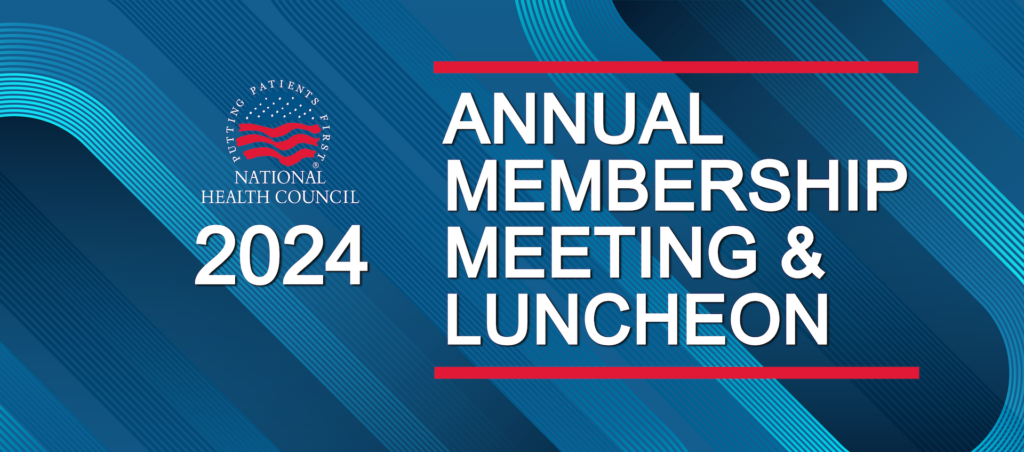

NHC Policy Priorities for 2023
By: Allen Pinn, Coordinator, Policy
Every year, the National Health Council (NHC) creates policy priorities that reflect the most pressing issues to the 160 million individuals living with chronic diseases and disabilities and their family caregivers. The NHC’s policy matrix symbolizes the work NHC is committed to pursuing to fulfill our mission of Putting Patients First.
2022 proved to be an eventful year in the health care space. The passage of the Inflation Reduction Act (IRA) and PDUFA VII signify continued strides made in the health policy realm. Although both laws will benefit the lives of millions of Americans, more work is needed to create a society where more individuals have access to quality and affordable health care. And the IRA represents a massive overhaul of the pharmaceutical research and delivery systems, creating potential unintended consequences that must be monitored and mitigated during implementation.
The 2023 Policy Matrix provides our members insight into the National Health Council’s goals for 2023. The NHC has outlined many priorities in the 2023 matrix including pandemic preparedness, medical innovation, health care costs, patient access, improving insurance coverage, and addressing mental/behavioral health. These health care issues are some of the most pressing to our members, and the NHC is committed to work steadfast in advocating for change on their behalf.
The policy matrix is designed by our Board Policy Committee, which receives input from our member organizations. Meetings held by the Health Care Reform and Medical Innovation Action Teams provide significant feedback on what the NHC should pursue as its priorities in the following year. These meetings along with the annual Washington Representatives Retreat and annual issue survey give members multiple opportunities to make their voices heard. The Matrix was approved by the NHC Board of Directors at its December Board Meeting today.
The NHC policy matrix is composed of four quadrants: Lead, Partner, Engage as Needed, and Monitor. The matrix is based on a scale that places issues based on the NHC’s ability to influence change and the importance to the patient community as key factors. Below is a summary of the health care priorities outlined in the matrix.
Equity
Equity being centered in the matrix indicates the NHC’s continued commitment to ensuring health equity across the health care ecosystem. We have workstreams that are specifically focused on health equity, and we make sure our other policy priorities include considerations of improving health equity.
In 2023, the NHC will continue focusing on:
- Promoting an inclusive, equitable, accessible, and high-quality care delivery system;
- Advocating for equitable access to affordable and comprehensive health insurance coverage;
- Partnering with organizations that have a record of accomplishment in addressing social drivers of health to reduce health disparities; and
- Collaborating with the biomedical and health-services research and the health economics ecosystem to support equity in development and valuation of new and innovative treatments and services, including the collection and reporting of demographic factors in research to include race, disability status, ethnicity, age, sexual orientation and gender identity, and other factors to help identify and eliminate biases.
To learn more about the NHC’s specific health equity work, click here.
Lead Quadrant:
The Lead quadrant exemplifies issue areas the NHC will actively lead in advocacy efforts. For each of these, the NHC develops principles, specific recommendations, and directly engages with policymakers regarding advocacy. Below are the four main areas regarded as urgent issues among the NHC and our Board Policy Committee:
- Patient Access: The NHC will lead efforts on utilization management, Centers for Medicare and Medicaid patient engagement, and telehealth. The COVID-19 pandemic has highlighted the benefit telehealth has played in the lives of individuals living with chronic illnesses. The NHC is committed to leading efforts in telehealth’s expansion and affordability while ensuring it serves as one of multiple options.
- Health Care Costs: The highest priority issues related to reducing health care costs that the NHC will address include promoting system–wide transparency of costs and cost-sharing, implementing the redesign of Medicare Part D to include an out-of-pocket cap that can be smoothed through a calendar year, and better consideration of patients’ perspectives in Medicare price negotiation and value assessment.
- Medical Innovation: Bringing new treatments and cures to patients is at the core of the NHC’s work regarding medical research. Following the enactment of PDUFA VII, the NHC will closely monitor its implementation as we enter 2023 and will participate in all opportunities to shape newly funded FDA initiatives. The NHC will also continue to advocate for more clinical trial diversity and improvements to the accelerated approval process.
Partner Quadrant:
The Partner quadrant displays issues the NHC will work in partnership with member organizations in addressing. Across the NHC’s membership, organizations work towards making patients’ voices better heard. For each topic, the NHC is an active participant in coalitions, member organizations, or other active partnerships.
The issues NHC plans to work in tandem with our partners with include:
- Quality Measurement
- Copay Accumulators
- Increasing and Improving Insurance Coverage including:
- Affordable Care Act (ACA) Market Improvement
- Medicaid Redetermination
- Closing the Medicaid Gap
- Medicare Advantage
- Health Appropriations
And for the first time, mental/behavioral health is an issue to be addressed specifically. The NHC recognizes the ongoing mental health crisis and its impact on people with all chronic conditions and is prioritizing advocating for substantive policy solutions by partnering with our member mental health organizations and other groups.
Engage as Needed Quadrant:
The Engage as Needed Quadrant highlights priorities that the NHC will continue to track and actively engage in if deemed needed and appropriate. Included in this quadrant are the following:
- Pandemic Preparedness and Response
- Unwinding of the Public Health Emergency (PHE)
- Long COVID Support
- Public health infrastructure
- Disease Prevention
- Health Care Workforce
- Surprise Medical Billing
- Outcomes/Value-Based Arrangements
Monitor Quadrant:
The Monitor quadrant comprises of issues that the NHC will watch closely but not actively engage. The NHC will monitor the implementation of the following:
- Medical Device User Fee Amendments (MDUFA)
- Generic Drug User Fee Amendments (GDUFA)
- Biosimilar Drug User Fee Amendments (BsUFA)
Lastly, as the opioid epidemic continues to impact the lives of millions of Americans, the NHC will be closely monitoring developments in addressing opioids and pain management.
Conclusion
The NHC looks forward to prioritizing these high-profile issues as we enter the new year. Putting Patients First is at the forefront of the NHC’s mission, and the policy matrix reflects our members’ continued efforts in creating a health care system that increases access to high-value, affordable, equitable, and sustainable care.
If you have any questions about the NHC’s policy priorities or 2023 policy matrix, please contact Eric Gascho, Senior Vice President, Policy and Government Affairs.


